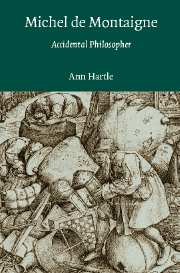Book contents
- Frontmatter
- Contents
- Acknowledgments
- Note on the Texts
- Introduction
- PART I A NEW FIGURE
- 1 “That Is Where He Got It!”: Montaigne's Caprices and the Humors of Ancient Philosophy
- 2 Bending and Stretching the Categories of Traditional Metaphysics
- 3 The Essay as Philosophical Form
- PART II ACCIDENTAL PHILOSOPHY
- PART III THE CHARACTER OF THE ACCIDENTAL PHILOSOPHER
- Notes
- Works Cited
- Index
2 - Bending and Stretching the Categories of Traditional Metaphysics
Published online by Cambridge University Press: 23 July 2009
- Frontmatter
- Contents
- Acknowledgments
- Note on the Texts
- Introduction
- PART I A NEW FIGURE
- 1 “That Is Where He Got It!”: Montaigne's Caprices and the Humors of Ancient Philosophy
- 2 Bending and Stretching the Categories of Traditional Metaphysics
- 3 The Essay as Philosophical Form
- PART II ACCIDENTAL PHILOSOPHY
- PART III THE CHARACTER OF THE ACCIDENTAL PHILOSOPHER
- Notes
- Works Cited
- Index
Summary
Latin was the language that Montaigne learned first, and when he dabbled for a time in composing verse, he did so in Latin. But his Latin verse was always imitative, revealing the poet he had just been reading. The Essays are written in French, his second language, and some of the earliest essays “smell a bit foreign” (VS875; F667), suggesting perhaps the beginning stages of breaking free from imitation.
French is “a weaker idiom,” abundant in images but tending to give way under a powerful conception (VS440; F320). So it is for able minds to give value to a language, “not so much by innovating as by filling it out with more vigorous and varied services, by stretching it and bending it. They do not bring to it new words, but they enrich their own, give more weight and depth to their meaning and use; they teach the language unaccustomed movements, but prudently and shrewdly” (VS873; F665). He contrasts the many French writers of his day with the great Latin poets: these French writers care for nothing but novelty. “To seize a new word they abandon the ordinary one, which is often stronger and more sinewy.” Virgil, on the other hand, “has the object more vividly imprinted in the soul,” and Horace “sees more clearly and deeply into the thing.” His mind “unlocks and ransacks the whole storehouse of words and figures in order to express itself.…
- Type
- Chapter
- Information
- Michel de MontaigneAccidental Philosopher, pp. 39 - 61Publisher: Cambridge University PressPrint publication year: 2003

